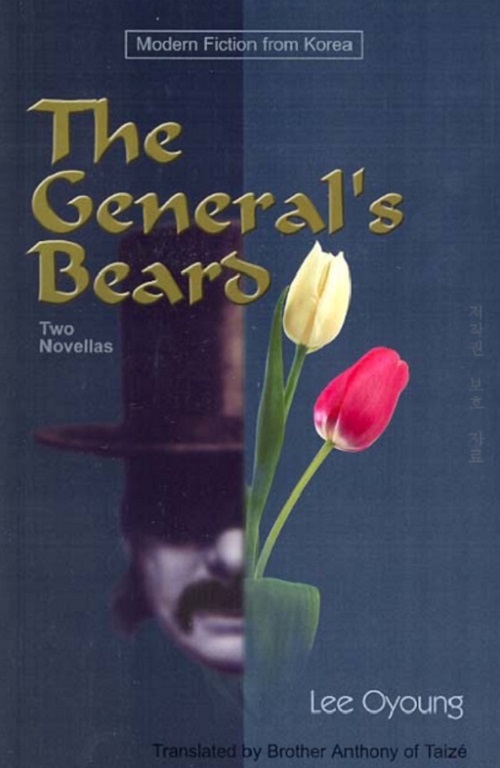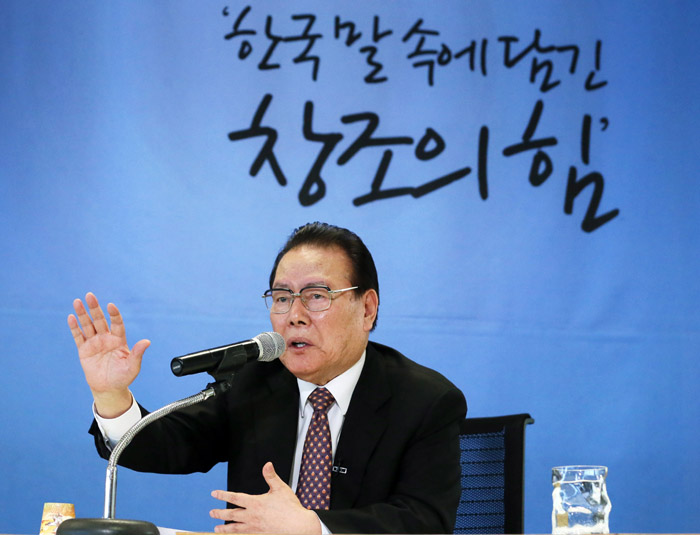The first novella penned by Lee Oyoung, who has had a successful literary career as a critic, novelist and poet, was “The General’s Beard.”
It is a detective story that is made complex by the presence of quotations from a novel written by a young man in the story, Kim Chol-hun.

The suspicious death of the young man forms the starting point of the tale. Considered to be a person of interest in the mysterious death, the main character sets out to figure out how and why Kim died. He tries to get clues from the deceased’s relatives and girlfriend. In the process, the narrator finds that Kim was writing a novel and left it unfinished upon his death, a novel titled “The General’s Beard.”
In the story, every man across society is growing a beard. The phenomenon came about after a general with a beard succeeded in a military coup. The general’s beard then, quite literally, spreads like an epidemic. The novel’s hero, however, refuses to grow a beard. His resistance plunges him into trouble, as he begins to feel increasingly uncomfortable and suffers all kinds of bullying and pressure from society.
Reading the novel, the narrator gradually senses the writer’s despair about society and discovers that his feeling of isolation and loneliness might stem from his childhood experiences.
The narrator gets a hint from Kim’s novel, that he tried to keep himself aloof from modern, industrialized society, full of standardized people and behavior.
What the narrator discovers is that Kim was so indulged in writing his novel, he was seized by delusions and illusions. The point came in the tale where he began to confuse the real world with his imaginative world, and he ends up taking his own life.
Lee’s “The General’s Beard” novella was so popular upon its publication that it was even turned into a movie in 1968. The following year, the movie won a series of prestigious awards, including the fifth Baeksang Best Film, Best Director and Best Music awards, the seventh Grand Bell Best Screenplay award and the third White Horse Best Director award. The film was featured in the fourth Chicago International Film Festival, as well.

“The general’s beard in my story is inspired by the very beard of Fidel Castro, the Cuban revolutionary,” explained Lee. “I was trying to tell the story of a guy who was ostracized for refusing to follow common customs and traditions stemming from a form of military revolution as could happen in either Korea or in Western countries.”
“The Kim Chul-hun character in my story depicts in his own novel a human who refuses the standardization of society, here symbolized by ‘the general’s beard.’ He is the kind of person who says, ‘No,’ when everyone around him says, ‘Yes.’”
Born in 1934 in Asan, Chungcheongnam-do (South Chungcheong Province), Lee graduated from Seoul National University with both an undergraduate and graduate degree in Korean Literature. In 1955, he made his literary debut with his first piece of literary criticism, “Idealism,” which was published in his alma mater’s newspaper. He then served as an editor at major dailies across Seoul, including the Chosun Ilbo, Hankook Ilbo, JoongAng Ilbo and Kyunghyang Shinmun.
From 1967, he began to teach Korean literature, first at Kyunggi High School and then at both Dankook University and Ewha Womans University. He also became the country's first minister of culture when the ministry was formed in 1990.
Some of his literary works include the essays “In This Earth & In That Wind” and “The Generation That Lives Today,” as well as the critical collections “Literature of Resistance,” “Literature in the Age of Curfew” and “The Birth of Youth.”
*This article has been made possible through the cooperation of the Literature Translation Institute of Korea.
By Sohn JiAe
Korea.net Staff Writer
jiae5853@korea.kr
It is a detective story that is made complex by the presence of quotations from a novel written by a young man in the story, Kim Chol-hun.

Lee Oyoung’s novella “The General’s Beard” is now published in English.
The suspicious death of the young man forms the starting point of the tale. Considered to be a person of interest in the mysterious death, the main character sets out to figure out how and why Kim died. He tries to get clues from the deceased’s relatives and girlfriend. In the process, the narrator finds that Kim was writing a novel and left it unfinished upon his death, a novel titled “The General’s Beard.”
In the story, every man across society is growing a beard. The phenomenon came about after a general with a beard succeeded in a military coup. The general’s beard then, quite literally, spreads like an epidemic. The novel’s hero, however, refuses to grow a beard. His resistance plunges him into trouble, as he begins to feel increasingly uncomfortable and suffers all kinds of bullying and pressure from society.
Reading the novel, the narrator gradually senses the writer’s despair about society and discovers that his feeling of isolation and loneliness might stem from his childhood experiences.
The narrator gets a hint from Kim’s novel, that he tried to keep himself aloof from modern, industrialized society, full of standardized people and behavior.
What the narrator discovers is that Kim was so indulged in writing his novel, he was seized by delusions and illusions. The point came in the tale where he began to confuse the real world with his imaginative world, and he ends up taking his own life.
Lee’s “The General’s Beard” novella was so popular upon its publication that it was even turned into a movie in 1968. The following year, the movie won a series of prestigious awards, including the fifth Baeksang Best Film, Best Director and Best Music awards, the seventh Grand Bell Best Screenplay award and the third White Horse Best Director award. The film was featured in the fourth Chicago International Film Festival, as well.

Lee Oyoung, who served as the country's first minister of culture, is still engaged in many creative activities. (photo: Yonhap News)
“The general’s beard in my story is inspired by the very beard of Fidel Castro, the Cuban revolutionary,” explained Lee. “I was trying to tell the story of a guy who was ostracized for refusing to follow common customs and traditions stemming from a form of military revolution as could happen in either Korea or in Western countries.”
“The Kim Chul-hun character in my story depicts in his own novel a human who refuses the standardization of society, here symbolized by ‘the general’s beard.’ He is the kind of person who says, ‘No,’ when everyone around him says, ‘Yes.’”
Born in 1934 in Asan, Chungcheongnam-do (South Chungcheong Province), Lee graduated from Seoul National University with both an undergraduate and graduate degree in Korean Literature. In 1955, he made his literary debut with his first piece of literary criticism, “Idealism,” which was published in his alma mater’s newspaper. He then served as an editor at major dailies across Seoul, including the Chosun Ilbo, Hankook Ilbo, JoongAng Ilbo and Kyunghyang Shinmun.
From 1967, he began to teach Korean literature, first at Kyunggi High School and then at both Dankook University and Ewha Womans University. He also became the country's first minister of culture when the ministry was formed in 1990.
Some of his literary works include the essays “In This Earth & In That Wind” and “The Generation That Lives Today,” as well as the critical collections “Literature of Resistance,” “Literature in the Age of Curfew” and “The Birth of Youth.”
*This article has been made possible through the cooperation of the Literature Translation Institute of Korea.
By Sohn JiAe
Korea.net Staff Writer
jiae5853@korea.kr